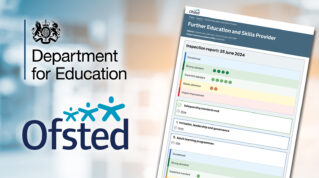The further education and skills sector has long been accustomed to change. New Ofsted frameworks, shifting government policy and evolving business demands are constants in a landscape that requires resilience. The release of Ofsted’s latest Education Inspection Framework (EIF) is another such moment, testing the ability of providers, colleges, universities and employer providers to steer a steady course.
Each new framework can create nervous energy, with leaders pressed to reconfigure provision or inspection readiness. Yet while frameworks change, the essence of inspection does not. High-quality delivery, with learners at the centre, remains the anchor. Providers who prioritise sustained quality, not short-term compliance, are the ones who thrive. At the Fellowship of Inspection Nominees (FIN), members with multi-year quality strategies consistently withstand turbulence.
National Grid illustrates this resilience. The employer provider was graded outstanding for the fourth consecutive time in September 2025 for its transmission apprenticeships, confirming two decades of excellence in education and training. Delivering apprenticeships at Levels 3 and 4 across engineering and power networks, it currently trains more than 160 apprentices. Inspectors praised the company’s investment in both training and well-being, noting that apprentices “value their trainers’ expertise and the high-quality resources that support their learning”.
Employer providers lie furthest from the apprenticeship regulatory framework, since their primary focus is operations, not education. For National Grid, keeping the nation’s lights on remains paramount. Yet the company’s culture of continuous improvement, reflected in the question “What could we do even better?”, has ensured provision stays learner-centred, staff are supported and programmes align with industry needs. Excellence has become routine rather than exceptional.
As a FIN member since 2019, National Grid has drawn on training, networks and external challenge to sustain performance. Over two decades it has successfully navigated the transition from frameworks to standards, shifting funding body rules, successive Ofsted frameworks, business restructuring, safeguarding pressures and rapid technological change.
FIN highlights that too often data, such as qualification achievement rates, sits quietly with management information teams rather than shaping curriculum or strategy. National Grid provides a contrast: its leaders adopt a forensic approach to analysing data, explaining anomalies and remaining resilient through change. FIN’s experience shows that when data literacy and strategic leadership combine, providers gain confidence to tell their story, impress inspectors and improve outcomes.
Strong oversight is equally vital. National Grid has long recognised that weak governance underpins poor provision. It has used FIN to provide scrutiny, guidance and challenge. Ofsted’s latest report confirmed that its governors “provide strong strategic oversight. They work closely with leaders to review safeguarding, curriculum quality and apprentice outcomes”.
Unlike providers who treat governance as a compliance exercise, National Grid embraces it as a driver of sustainability.
The EIF also places new emphasis on inclusion, requiring evidence that provision is accessible to all and that additional needs are met. Inclusion is not an add-on: it directly shapes outcomes and progression. National Grid demonstrates how embedding inclusive recruitment, tailored support and mentoring can ensure apprentices with special educational needs or neurodiverse profiles progress on par with their peers.
The challenge ahead lies in Ofsted’s shift from a “best fit” to a “secure fit” model, meaning providers must meet all criteria within an evaluation area to gain the expected grade. For safeguarding, only “effective” or “ineffective” judgements remain, with effectiveness requiring all six key standards to be met fully. The bar has been raised.
Yet the fundamentals remain unchanged. Sustained quality rests on multi-year improvement plans, clear vision, effective use of data, investment in staff and the empowerment of the Ofsted nominee as a strategic leader. Collaboration through networks like FIN remains central, enabling providers to stay agile and share practice.
Frameworks and policies will evolve, but providers anchored in quality, inclusion and oversight will adapt and thrive. As Ofsted concluded of National Grid; “Leaders are highly ambitious for their apprentices. They view them as an important investment in the company’s future and aim for them to stay long after completion, which most do”.
By asking what could be done even better, embedding inclusion and treating quality as a strategic journey rather than a compliance exercise, providers can hold steady in choppy waters and emerge stronger.

















A great article. I would argue that employer provision where it focussed is the easiest to deliver and get OFSTED 1. We ran the Premier League programme and was the easiest programme in the world to deliver as well as a number of automotive programmes with own contracts. The provision is focussed, the learners are motivated and there are consequences if not, the employer has great facilities and equipment to learn upon.
But I do agree that providers drive for OFSTED 1 and it becomes all encompassing ending with a target on your back. If I had my time again, 2 was good enough and we certainly would never have had the spotlight we did because of the 1 and the envy that comes with it